/sub-categories/research-papers
Research Papers
Efficacy, effectiveness and acceptability of closed containers, Moringa oleifera and in-home chlorination - A paper from AJTMH
Posted on 04 Nov, 2011 12:38 PMThis study published in the journal The American Journal of Tropical Medicine and Hygiene (AJTMH) aimed at assessing water contamination and the relative effectiveness of three options for point-of-use water treatment in South India.
Environmental monitoring programme on water quality in Kerala – A report by KSCSTE and CWRDM
Posted on 03 Nov, 2011 08:54 PM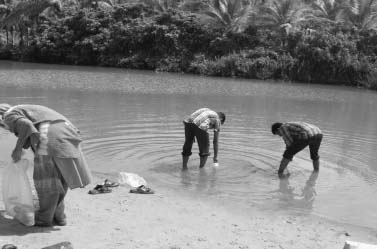 This report by the Kerala State Council for Science, Technology and Environment (KSCSTE) and Centre for Water Resources Development and Management (CWRDM) on water quality monitoring in Kerala covers all its forty four river basins. This is being done under the “Environmental Monitoring Programme on Water Quality” under which samples are being collected both from surface and groundwater sources.
This report by the Kerala State Council for Science, Technology and Environment (KSCSTE) and Centre for Water Resources Development and Management (CWRDM) on water quality monitoring in Kerala covers all its forty four river basins. This is being done under the “Environmental Monitoring Programme on Water Quality” under which samples are being collected both from surface and groundwater sources.
Groundwater sampling stations were fixed after conducting a sanitary survey in the panchayats. Water Quality Information System is being developed using Geographical Information Systems (GIS) to manage the water quality from point or non-point source of pollution.
In the first phase of the project, three river basins of Kerala viz. Kabbini, Periyar and Neyyar were monitored. The network was later expanded to basins such as Chaliyar, Kadalundi, Meenachil, Karamana, Anjarakandi, Pamba, Muvattupuzha, Bharatapuzha, and Chalakudy.
Impacts of climate change on public health in India - Paper published in Environmental Health Perspectives
Posted on 03 Nov, 2011 07:40 PMThis paper published in the journal Environmental Health Perspectives briefly summarises the relevant literature and highlights the challenges and opportunities for innovative research in the context of the impact of changing temperatures and precipitation patterns due to climate change on the health of populations from developing countries such as India.
Climate change impact assessment of water resources of India - A paper from Current Science
Posted on 02 Nov, 2011 10:52 AMThis paper published in the journal Current Science presents the findings of a study has been taken up to quantify the possible impacts of the climate change on the water resources of Indian river systems within the constraints of the uncertainty of climate change predictions. The study uses the PRECIS daily weather data to determine the spatio-temporal water availability in the river systems.
A distributed hydrological model, namely SWAT has been used to simulate all the river basins of the country. The analysis has been performed to evaluate the severity of droughts and floods and thus identify the vulnerable hotspots that may require attention in view of the climate change in various parts of the country.
Impacts of climate change and climate variability on the water resources are likely to affect irrigated agriculture, installed power capacity, environmental flows in the dry season and higher flows during the wet season, thereby causing severe droughts and floods in urban and rural areas. Climate change impacts on water resources which are addressed and analysed in the present study include impacts on annual and inter-annual water availability as well as extreme events of droughts and floods.
A decade of the Total Sanitation Campaign - Rapid assessment of processes and outcomes - A report by the World Bank
Posted on 01 Nov, 2011 10:07 PM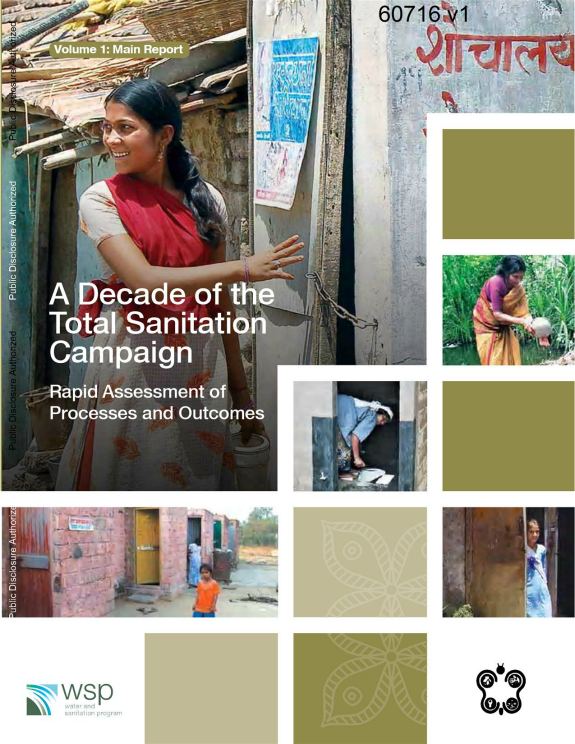 This report by the Water and Sanitation Program (WSP), The World Bank analyses primary and secondary data from the Total Sanitation Campaign (TSC) of the Government of India, which has been in operation for over a decade (1999 to date).
This report by the Water and Sanitation Program (WSP), The World Bank analyses primary and secondary data from the Total Sanitation Campaign (TSC) of the Government of India, which has been in operation for over a decade (1999 to date).
The audience for this report includes policy-makers and implementers at national, state and district levels, and the broader sanitation and hygiene community. The report aims at gaining an understanding of the processes, outputs and outcomes of the campaign at a national level and across the states as compared with the inputs that have gone into the program.
The report draws on these indicators, which are then compared individually and in combination to benchmark the states, to understand the relative performance of the states. This benchmarking, based on a combination of eight indicators, is undertaken for both states and districts across the country.
Problems of hill states and hill areas and ways to ensure that they do not suffer in any way because of their peculiarities - Report of the Task Force - Planning Commission
Posted on 01 Nov, 2011 09:37 PMThis report by the Task Force, constituted by the Planning Commission, Government of India in April, 2008, is an outcome of the need expressed by the Prime Minister of India for a fresh analysis of the problems of the hill states and hill areas of the country in a manner that suggests that these areas do not suffer in any way on account of their peculiarities.
Opinions have been expressed that the pace of development of the Indian Himalayan Region (IHR) has been slow when compared to the rest of the country. At the same time, its fragile nature and difficulty of taking up conventional development initiatives has not been appreciated. In this report, arguments have been presented recommending reshaping of policies to bring in the “mountain perspective” for the IHR, in the national planning. Emphasis has also been laid on developing norms for good governance and for harnessing social capital at the grassroots.
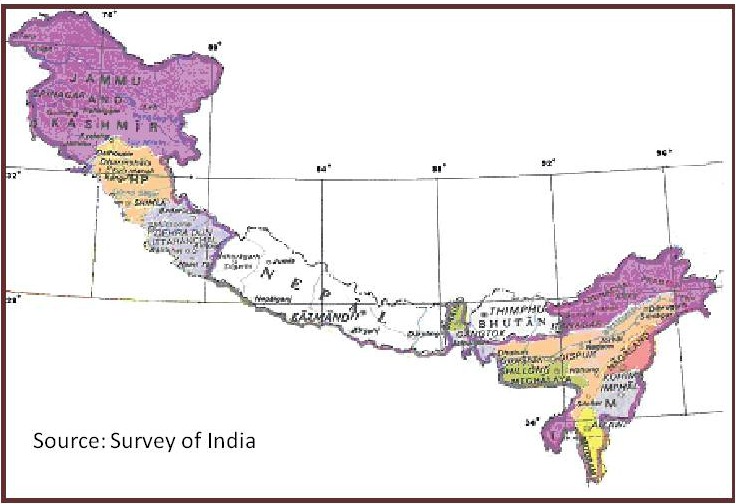
Lakes in Mumbai – A draft report by WWF India
Posted on 01 Nov, 2011 08:59 PM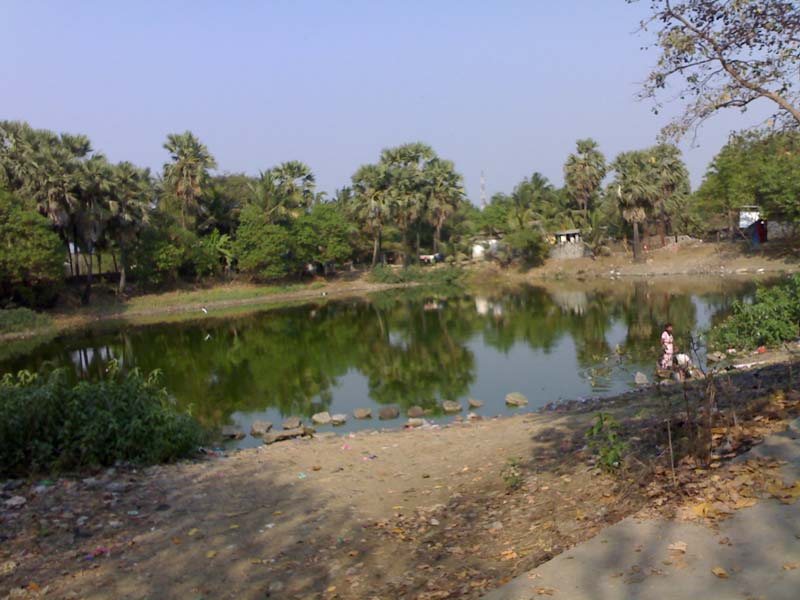 This draft report on the study of lakes by the World Wildlife Fund for Nature (India) documents the physical condition of the lakes in Mumbai. Apart from the three lakes - Tulsi, Powai and Vihar that used to provide water to Mumbai residents, there are many lakes in the Bombay Municipal Corporation jurisdiction that are either polluted by human sewage or industrial effluents and have remained neglected with increasing urbanization.
This draft report on the study of lakes by the World Wildlife Fund for Nature (India) documents the physical condition of the lakes in Mumbai. Apart from the three lakes - Tulsi, Powai and Vihar that used to provide water to Mumbai residents, there are many lakes in the Bombay Municipal Corporation jurisdiction that are either polluted by human sewage or industrial effluents and have remained neglected with increasing urbanization.
There is very little to no data available on the existence of lakes of Mumbai. Several RTI’s to the government bodies also revealed that there was a lacuna in terms of the availability of the data; as a result most of the water bodies are easily exploited. Under this study the baseline data was prepared with the help of Google Earth website. The areas appearing to be lakes were marked on the Google Earth Images. These were verified by the field staff through onsite visits. The survey was conducted during September and October, 2008 and March, 2009. The study considers only the fresh water lakes which were accessible and saline water impoundments have not been considered.
Zero tillage in the rice-wheat systems of the Indo-Gangetic plains - A review of impacts and sustainability implications by IFPRI
Posted on 31 Oct, 2011 06:49 PM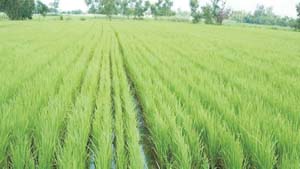 This paper by the International Food Policy Research Institute (IFPRI) reviews the success of zero-tillage wheat in the rice-wheat systems of the Indo-Gange
This paper by the International Food Policy Research Institute (IFPRI) reviews the success of zero-tillage wheat in the rice-wheat systems of the Indo-Gange
Equity and inclusion in sanitation and hygiene in South Asia - A regional synthesis paper - WSSCC, UNICEF and WaterAid
Posted on 31 Oct, 2011 03:31 PMThis working paper by the Water Supply and Sanitation Collaborative Council (WSSCC), UNICEF and WaterAid highlights the fact that a staggering 716 million men, women and children defecate in the open every day, in South Asia, contributing to the most appalling concentration of poverty and disease and the poorest standards of hygiene in the world.
Use of ICT for effective urban governance and service delivery in India - A selection of cases - ASCI and CISCO
Posted on 31 Oct, 2011 09:17 AMThis compendium published by Administrative Staff College of India (ASCI) and CISCO presents selective cases on the use of ICT for effective urban governance and service delivery in India. The document includes the following chapters/sections: